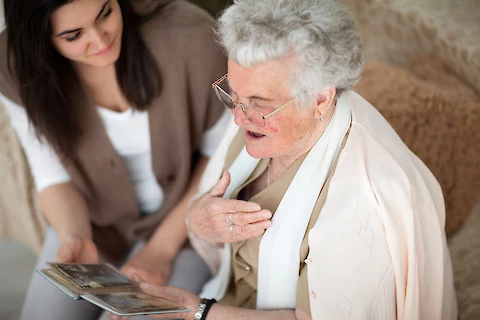
As our loved ones grow older, ensuring their cognitive health becomes increasingly important. One enjoyable and effective way to support seniors' memory retention is through the power of storytelling.
If you're an adult child or caregiver of a senior relative, you may be wondering how you can help them stay mentally sharp for as long as possible. Sharing stories and memories is a great way to help protect memories and keep seniors functioning at a higher cognitive level.
The Benefits of Sharing Stories
Sharing stories with seniors does more than just help them pass the time; it provides tangible cognitive and emotional benefits. By engaging with memories and past experiences, seniors can strengthen the neural connections in their brain, promoting overall brain health.
Additionally, reminiscing can be a source of emotional well-being, as recalling happy memories can bring joy and comfort, while discussing difficult times can help process and heal from past events. Moreover, storytelling serves as an excellent opportunity for social interaction, allowing seniors to connect with family and friends on a deeper level. Lastly, engaging in these conversations helps preserve family history and honors the rich tapestry of personal experiences that have shaped our loved ones' lives.
Expert Insights on Reminiscing and Memory Retention
Gerontologists, who specialize in the study of aging, emphasize the positive effects of storytelling on seniors' cognitive health. By accessing memories and sharing them with others, seniors engage in mental exercise, which can help delay cognitive decline.
Psychologists also highlight the mental health benefits associated with reminiscing. Sharing stories can be therapeutic, allowing seniors to gain insight, release emotions, and make sense of their life experiences. Research studies continue to support the strong link between storytelling and memory preservation, proving that engaging in these conversations can play a vital role in retaining our seniors' memories.
Practical Tips for Engaging in Shared Storytelling Sessions with Seniors
To create a successful and enjoyable storytelling experience with seniors, consider the following tips:
1. Create a comfortable and relaxed environment.
Set the stage for storytelling by creating a cozy atmosphere that encourages open communication. Eliminate distractions, such as turning off the TV, and ensure your loved one is seated comfortably.
2. Encourage seniors to share stories from their past.
Ask your loved one about their favorite memories, experiences, or even advice they've learned throughout their life. This gentle encouragement can help them open up and share their unique stories.
3. Use prompts to spark memories.
Photos, music, or objects with sentimental value can serve as excellent memory triggers. Share these items with your loved one, and see where the conversation leads.
4. Actively listen and ask open-ended questions.
Show genuine interest in your loved one's stories by listening attentively, maintaining eye contact, and asking open-ended questions that encourage them to share more details.
5. Document the stories for future reference.
Keep a journal or create audio recordings of your storytelling sessions to preserve these precious memories for future generations.
Local Resources and Support for Memory Care
Incorporating storytelling into the care of seniors can yield significant cognitive and emotional benefits, aiding in memory retention and enriching their lives with shared experiences. By actively supporting their cognitive health and engaging in these shared storytelling sessions, we can help our seniors retain their memories longer and treasure these invaluable connections.
If you're in need of assistance with senior care needs in Broomfield, Arvada, Westminster, Thornton, Northglenn, or Wheat Ridge, don't hesitate to contact Senior Helpers Denver South. Let's work together to preserve memories and enrich the lives of our cherished seniors.